|
|
|
Sort Order |
|
|
|
Items / Page
|
|
|
|
|
|
|
| Srl | Item |
| 1 |
ID:
138088
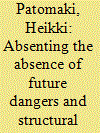

|
|
|
|
|
| Summary/Abstract |
One of the great appeals of securitization theory, and a major reason for its success, has been its usefulness as a tool for empirical research: an analytic framework capable of practical application. However, the development of securitization has raised several criticisms, the most important of which concern the nature of securitization theory. In fact, the appropriate methods, the research puzzles and type of evidence accepted all derive to a great extent from the kind of theory scholars bequeath their faith to. This Forum addresses the following questions: What type of theory (if any) is securitization? How many kinds of theories of securitization do we have? How can the differences between theories of securitization be drawn? What is the status of exceptionalism within securitization theories, and what difference does it make to their understandings of the relationship between security and politics? Finally, if securitization commands that leaders act now before it is too late, what status has temporality therein? Is temporality enabling securitization to absorb risk analysis or does it expose its inherent theoretical limits?
|
|
|
|
|
|
|
|
|
|
|
|
|
|
|
|
| 2 |
ID:
138082
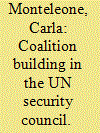

|
|
|
|
|
| Summary/Abstract |
Political coalitions in the international system are still understudied in International Relations theory. This article claims that the formation of and variations in coalitions in the international system are affected by changes in their bargaining power and bargaining environment related to the global leadership cycle and by long-term organisational changes of the international political system. Identifying the Security Council as the institution in which states are more likely to keep their systemic preferences at the institutional level, the article studies the presence, formation and change of coalitions in the international system by testing variations in the behaviour of the Security Council members in the period 1993–2012. To overcome methodological difficulties, it proposes to analyse sponsoring rather than voting behaviour. In the analysed period, the presence of a mutating dominant coalition, signs of potential coalitions in the making and an increase in participation and competition resulting from modifications in the organisational form of the international system are found.
|
|
|
|
|
|
|
|
|
|
|
|
|
|
|
|
| 3 |
ID:
138081
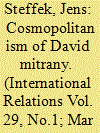

|
|
|
|
|
| Summary/Abstract |
In this article, I engage with the normative foundations of David Mitrany’s international political theory. My aim is to show that there is more to be found in Mitrany’s approach to international organization than the technocratic problem-solving often associated with his name today. To pinpoint the essence of Mitrany’s normative thought, I introduce the term ‘functional cosmopolitanism’. This variety of cosmopolitan theorizing starts from the equality of individual needs (not from rights or obligations), suggesting that transnational institutions, rather than states, should cater to these needs. An important aim of this ‘functional devolution’ is to limit and reconfigure public power, thus countering the threat of an ever more powerful nationstate. Mitrany’s proposal for introducing a functional dimension into the political system can be interpreted as a ‘thin’ cosmopolitanism, designed to free citizens from war and oppressive concentrations of political power, but vague in its ideas about individual political engagement.
|
|
|
|
|
|
|
|
|
|
|
|
|
|
|
|
| 4 |
ID:
138085
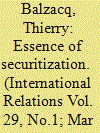

|
|
|
|
|
| Summary/Abstract |
One of the great appeals of securitization theory, and a major reason for its success, has been its usefulness as a tool for empirical research: an analytic framework capable of practical application. However, the development of securitization has raised several criticisms, the most important of which concern the nature of securitization theory. In fact, the appropriate methods, the research puzzles and type of evidence accepted all derive to a great extent from the kind of theory scholars bequeath their faith to. This Forum addresses the following questions: What type of theory (if any) is securitization? How many kinds of theories of securitization do we have? How can the differences between theories of securitization be drawn? What is the status of exceptionalism within securitization theories, and what difference does it make to their understandings of the relationship between security and politics? Finally, if securitization commands that leaders act now before it is too late, what status has temporality therein? Is temporality enabling securitization to absorb risk analysis or does it expose its inherent theoretical limits?
|
|
|
|
|
|
|
|
|
|
|
|
|
|
|
|
| 5 |
ID:
138084
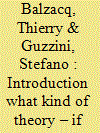

|
|
|
|
|
| Summary/Abstract |
One of the great appeals of securitization theory, and a major reason for its success, has been its usefulness as a tool for empirical research: an analytic framework capable of practical application. However, the development of securitization has raised several criticisms, the most important of which concern the nature of securitization theory. In fact, the appropriate methods, the research puzzles and type of evidence accepted all derive to a great extent from the kind of theory scholars bequeath their faith to. This Forum addresses the following questions: What type of theory (if any) is securitization? How many kinds of theories of securitization do we have? How can the differences between theories of securitization be drawn? What is the status of exceptionalism within securitization theories, and what difference does it make to their understandings of the relationship between security and politics? Finally, if securitization commands that leaders act now before it is too late, what status has temporality therein? Is temporality enabling securitization to absorb risk analysis or does it expose its inherent theoretical limits?
|
|
|
|
|
|
|
|
|
|
|
|
|
|
|
|
| 6 |
ID:
138083
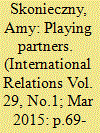

|
|
|
|
|
| Summary/Abstract |
In this article, I argue that seemingly ‘un-noteworthy’ interactions between states can demonstrate the significance of language for social relationships and foreign policy partnerships. Using language game analysis, I apply Peter Howard’s four-stage model to the case of the US–Turkish Economic Partnership Commission’s proposal for qualified industrial zones shortly after 9/11 and examine how the expectations for enhancing partnership are shaped and at times dashed through the language used among a network of actors. A language game analysis provides an explanation for how actors’ expectations rise and fall and provides an understanding of the maintenance, enhancement, and dismantling of state relationships in a social and practice-centered context. I utilize author interview data as well as texts from newspapers, speeches, and organizations to show how partnership between allies is vulnerable to social expectations signaled in and through the common language they both hold.
|
|
|
|
|
|
|
|
|
|
|
|
|
|
|
|
| 7 |
ID:
138080
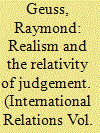

|
|
|
|
|
| Summary/Abstract |
E.H. Carr contrasts ‘realism’ with ‘utopianism’ in his major work in theorising international relations, but he ought to have contrasted it with ‘moralism’, which is a complex set of attitudes that give unwarranted priority to moral considerations in explaining and justifying human action. ‘Moralism’ is a flawed approach to politics. One should distinguish it from ‘utopianism’, which is made up of different strands, not all of which are equally problematic. One strand which has been historically important was centred around an attempt to describe and realise a perfect unchanging society, and Carr seems to have this in mind primarily when he speaks ‘utopianism’. However, there has been another strand which has focused on the social construction of ‘impossibility’ in politics, and our potential ability to undo that construction. Such utopianism is compatible with realism.
|
|
|
|
|
|
|
|
|
|
|
|
|
|
|
|
| 8 |
ID:
138086
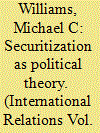

|
|
|
|
|
| Summary/Abstract |
One of the great appeals of securitization theory, and a major reason for its success, has been its usefulness as a tool for empirical research: an analytic framework capable of practical application. However, the development of securitization has raised several criticisms, the most important of which concern the nature of securitization theory. In fact, the appropriate methods, the research puzzles and type of evidence accepted all derive to a great extent from the kind of theory scholars bequeath their faith to. This Forum addresses the following questions: What type of theory (if any) is securitization? How many kinds of theories of securitization do we have? How can the differences between theories of securitization be drawn? What is the status of exceptionalism within securitization theories, and what difference does it make to their understandings of the relationship between security and politics? Finally, if securitization commands that leaders act now before it is too late, what status has temporality therein? Is temporality enabling securitization to absorb risk analysis or does it expose its inherent theoretical limits?
|
|
|
|
|
|
|
|
|
|
|
|
|
|
|
|
| 9 |
ID:
138087
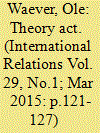

|
|
|
|
|
| Summary/Abstract |
One of the great appeals of securitization theory, and a major reason for its success, has been its usefulness as a tool for empirical research: an analytic framework capable of practical application. However, the development of securitization has raised several criticisms, the most important of which concern the nature of securitization theory. In fact, the appropriate methods, the research puzzles and type of evidence accepted all derive to a great extent from the kind of theory scholars bequeath their faith to. This Forum addresses the following questions: What type of theory (if any) is securitization? How many kinds of theories of securitization do we have? How can the differences between theories of securitization be drawn? What is the status of exceptionalism within securitization theories, and what difference does it make to their understandings of the relationship between security and politics? Finally, if securitization commands that leaders act now before it is too late, what status has temporality therein? Is temporality enabling securitization to absorb risk analysis or does it expose its inherent theoretical limits?
|
|
|
|
|
|
|
|
|
|
|
|
|
|
|
|
|
|
|
|
|